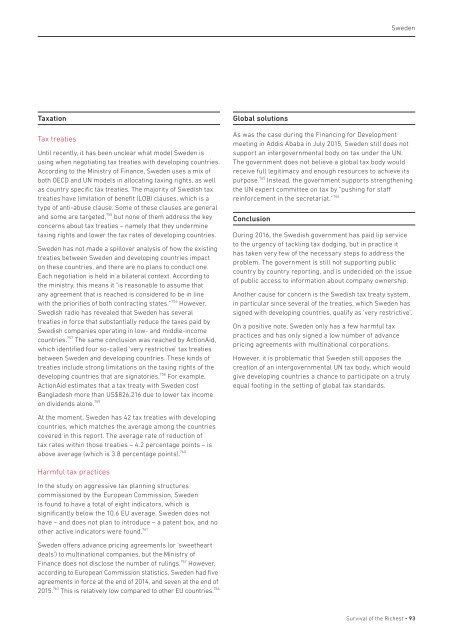You also want an ePaper? Increase the reach of your titles
YUMPU automatically turns print PDFs into web optimized ePapers that Google loves.
Sweden<br />
Taxation<br />
Global solutions<br />
Tax treaties<br />
Until recently, it has been unclear what model Sweden is<br />
using when negotiating tax treaties with developing countries.<br />
According to <strong>the</strong> Ministry <strong>of</strong> Finance, Sweden uses a mix <strong>of</strong><br />
both OECD and UN models in allocating taxing rights, as well<br />
as country specific tax treaties. The majority <strong>of</strong> Swedish tax<br />
treaties have limitation <strong>of</strong> benefit (LOB) clauses, which is a<br />
type <strong>of</strong> anti-abuse clause. Some <strong>of</strong> <strong>the</strong>se clauses are general<br />
and some are targeted, 755 but none <strong>of</strong> <strong>the</strong>m address <strong>the</strong> key Conclusion<br />
concerns about tax treaties – namely that <strong>the</strong>y undermine<br />
taxing rights and lower <strong>the</strong> tax rates <strong>of</strong> developing countries.<br />
Sweden has not made a spillover analysis <strong>of</strong> how <strong>the</strong> existing<br />
treaties between Sweden and developing countries impact<br />
on <strong>the</strong>se countries, and <strong>the</strong>re are no plans to conduct one.<br />
Each negotiation is held in a bilateral context. According to<br />
<strong>the</strong> ministry, this means it "is reasonable to assume that<br />
any agreement that is reached is considered to be in line<br />
with <strong>the</strong> priorities <strong>of</strong> both contracting states." 756 However,<br />
Swedish radio has revealed that Sweden has several<br />
treaties in force that substantially reduce <strong>the</strong> taxes paid by<br />
Swedish companies operating in low- and middle-income<br />
countries. 757 The same conclusion was reached by ActionAid,<br />
which identified four so-called ‘very restrictive’ tax treaties<br />
between Sweden and developing countries. These kinds <strong>of</strong><br />
treaties include strong limitations on <strong>the</strong> taxing rights <strong>of</strong> <strong>the</strong><br />
developing countries that are signatories. 758 For example,<br />
ActionAid estimates that a tax treaty with Sweden cost<br />
Bangladesh more than US$826,216 due to lower tax income<br />
on dividends alone. 759<br />
At <strong>the</strong> moment, Sweden has 42 tax treaties with developing<br />
countries, which matches <strong>the</strong> average among <strong>the</strong> countries<br />
covered in this report. The average rate <strong>of</strong> reduction <strong>of</strong><br />
tax rates within those treaties – 4.2 percentage points – is<br />
above average (which is 3.8 percentage points). 760<br />
Harmful tax practices<br />
In <strong>the</strong> study on aggressive tax planning structures<br />
commissioned by <strong>the</strong> European Commission, Sweden<br />
is found to have a total <strong>of</strong> eight indicators, which is<br />
significantly below <strong>the</strong> 10.6 EU average. Sweden does not<br />
have – and does not plan to introduce – a patent box, and no<br />
o<strong>the</strong>r active indicators were found. 761<br />
Sweden <strong>of</strong>fers advance pricing agreements (or ‘swee<strong>the</strong>art<br />
deals’) to multinational companies, but <strong>the</strong> Ministry <strong>of</strong><br />
Finance does not disclose <strong>the</strong> number <strong>of</strong> rulings. 762 However,<br />
according to European Commission statistics, Sweden had five<br />
agreements in force at <strong>the</strong> end <strong>of</strong> 2014, and seven at <strong>the</strong> end <strong>of</strong><br />
2015. 763 This is relatively low compared to o<strong>the</strong>r EU countries. 764<br />
As was <strong>the</strong> case during <strong>the</strong> Financing for Development<br />
meeting in Addis Ababa in July 2015, Sweden still does not<br />
support an intergovernmental body on tax under <strong>the</strong> UN.<br />
The government does not believe a global tax body would<br />
receive full legitimacy and enough resources to achieve its<br />
purpose. 765 Instead, <strong>the</strong> government supports streng<strong>the</strong>ning<br />
<strong>the</strong> UN expert committee on tax by "pushing for staff<br />
reinforcement in <strong>the</strong> secretariat." 766<br />
During 2016, <strong>the</strong> Swedish government has paid lip service<br />
to <strong>the</strong> urgency <strong>of</strong> tackling tax dodging, but in practice it<br />
has taken very few <strong>of</strong> <strong>the</strong> necessary steps to address <strong>the</strong><br />
problem. The government is still not supporting public<br />
country by country reporting, and is undecided on <strong>the</strong> issue<br />
<strong>of</strong> public access to information about company ownership.<br />
Ano<strong>the</strong>r cause for concern is <strong>the</strong> Swedish tax treaty system,<br />
in particular since several <strong>of</strong> <strong>the</strong> treaties, which Sweden has<br />
signed with developing countries, qualify as ‘very restrictive’.<br />
On a positive note, Sweden only has a few harmful tax<br />
practices and has only signed a low number <strong>of</strong> advance<br />
pricing agreements with multinational corporations.<br />
However, it is problematic that Sweden still opposes <strong>the</strong><br />
creation <strong>of</strong> an intergovernmental UN tax body, which would<br />
give developing countries a chance to participate on a truly<br />
equal footing in <strong>the</strong> setting <strong>of</strong> global tax standards.<br />
<strong>Survival</strong> <strong>of</strong> <strong>the</strong> <strong>Richest</strong> • 93


